Geology And Geophysics Student Awarded Houston Geological Society Top Scholarship
Geology and Geophysics Fast Track Degree student Rachel Schroeder recently received the top undergraduate scholarship awarded by the Houston Geological Society.
Dec 17, 2020
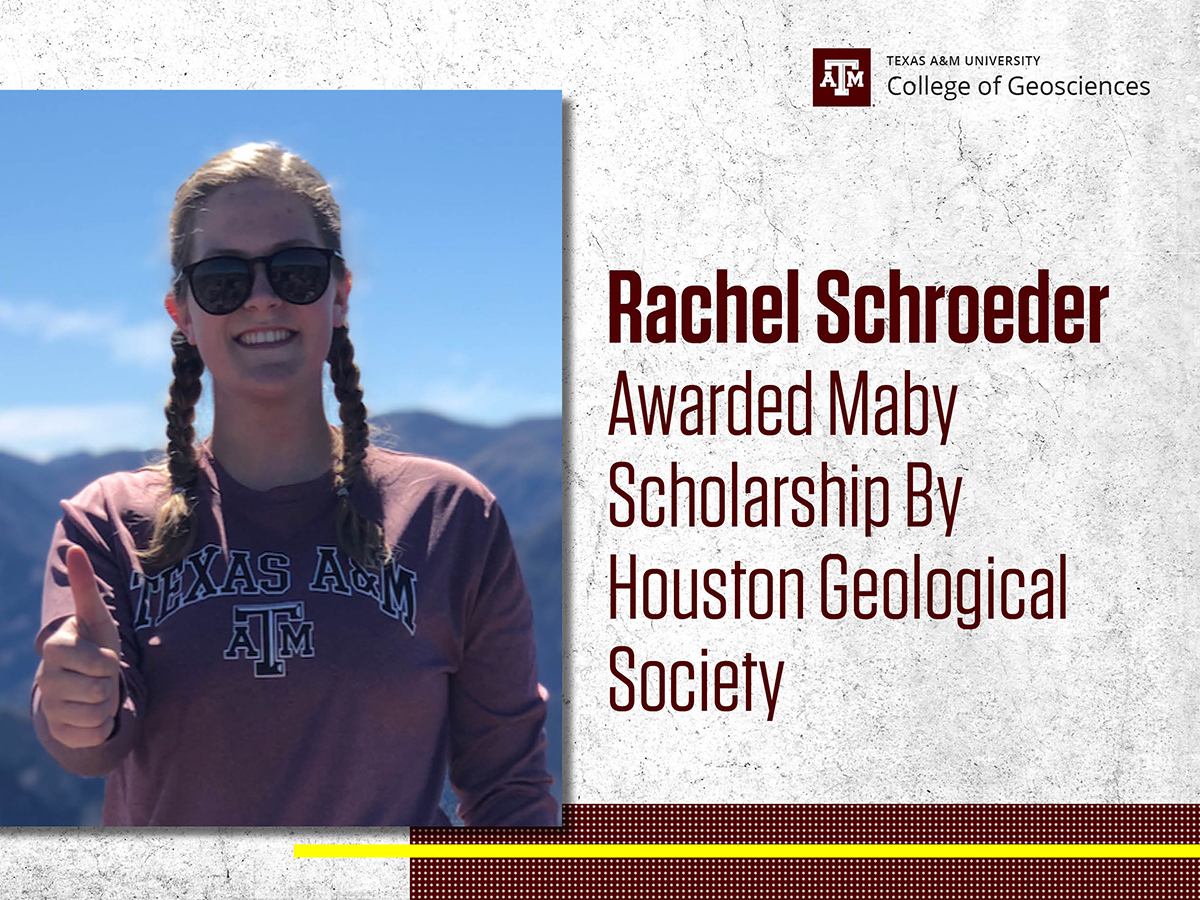
Texas A&M University Department of Geology and Geophysics Fast Track Degree student Rachel Schroeder was recently awarded the Maby Scholarship from the Houston Geological Society. The Maby Scholarship is awarded to the highest overall ranked student applicant.
Schroeder was nominated for the award by Dr. Anne Raymond, professor of geology and geophysics at Texas A&M.
“Winning this scholarship really feels like the culmination of a lot of hard work during my entire undergrad,” Schroeder said. “Balancing my schoolwork, research, organizations, an on-campus job, and my own mental health has been tough, and this summer was one of the craziest times for me.”
The Fast Track program is an accelerated 5-year path leading to a bachelor of science degree and a thesis option master of science in geology.
“I had a full-time internship, was a co-chair for Fish Camp (during the transition to a fully virtual experience), continued to give tours on campus, and started my graduate research all at once. Winning this scholarship makes me feel like all of my hard work over the last three years has really paid off and it refueled my passion for my schoolwork going into the spring semester. A much-needed boost of confidence that the hard work was being noticed by others and makes me feel like I can continue to succeed.”
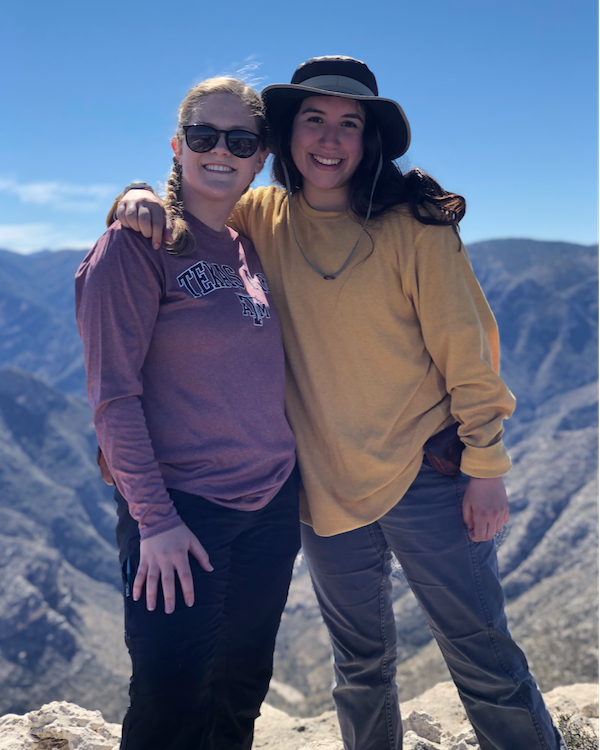
Schroeder and Ale Briseno ’20 at the top of the Permian Reef Trail, Guadalupe Mountains National Park, Texas. This picture was taken while on the Geology 250 Geological Field Methods course’s spring break field trip. (Photo courtesy of Rachel Schroeder.)
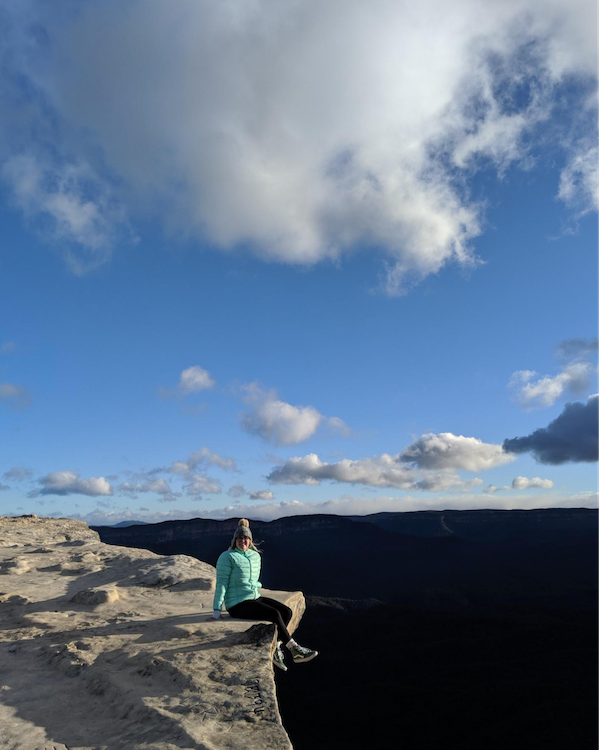
Schroeder is working with Dr. Nick Perez on the Peruvian Andes, as part of Perez’s National Science Foundation CAREER Award.
“Rachel joined my group as part of our first class of Fast Track students, and has been a joy to work with,” Perez said. “Despite the existing challenges of continuing to work a job and finish her undergraduate curriculum, she has taken on graduate coursework and is a Graduate Teaching Assistant, all while continuing to excel in what she does.”
Schroeder’s research has implications for reconstructing the style of mountain building during the Cenozoic, including testing how known phases of shallow subduction may have impacted deformation of the South American continent. Her unique dataset will help assess how the rates of erosion and depositional processes are linked to plate margin processes.
“It already feels as if she is a true early career scientist – she is reading papers, asking the right questions, works well independently and as a team member,” Perez said. "She has taken the lead on contacting collaborating labs for sample analyses, and is very quickly learning new techniques, including detrital zircon double dating with U-Pb and U-Th/He, as part of her research goals.”
“This project really feels like the right fit for me in graduate school and it was a driving factor for me applying to the Fast Track program,” Schroeder said. “So far, I have done grain picking and packing in Dr. Perez’s lab, but I am most looking forward to my trip to Connecticut and the chance to travel to Peru and do field work! I also enjoy that this project focuses on large-scale tectonics and understanding the complexities of subduction zones.”
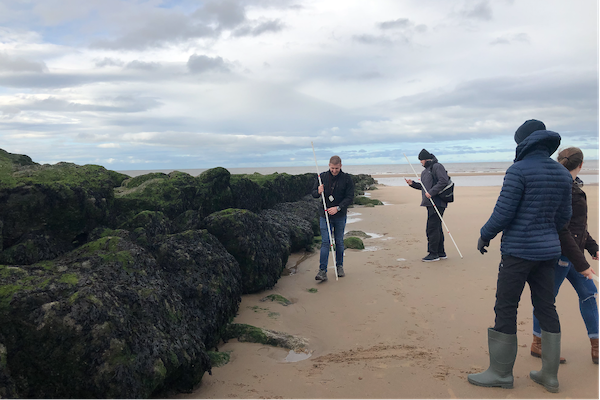
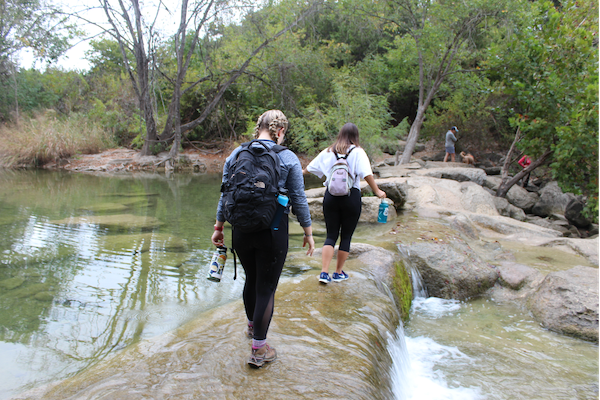
Schroeder first became interested in the Fast Track program after it was announced earlier this year. She knew she wanted to go to graduate school but with the uncertainty of Covid-19, she was unsure about securing a spot in a graduate program at another university.
“I had been working with Dr. Perez since Summer 2019 and felt that he would be a great advisor for my Master’s and would benefit from doing grad school with him and his team,” Schroeder said. “It really just felt like the right decision at the time, with all of the benefits of working with an advisor I knew on a really interesting project, and I would get the same degree as going to another school in a year less. The cards just all fell into place and looking back, it was a great decision!”
For students interested in applying to the Geology and Geophysics Fast Track program, Schroeder recommends students get involved in research as early as possible.
“Research at Texas A&M ignited my passion for geology and has given me hands-on experience in different fields,” Schroeder said. “Undergrad research gave me the chance to learn how to read papers, work with a team, and do independent study, all of which are core pieces of my graduate school experience thus far."
Because the program is accelerated, she said, already having an advisor who you work well with and having the beginnings of a project discussed helps start your Fast Track program off on the right foot.
“Studying abroad was also a great chance to see how geology was taught at other universities and learn from other advisors and I would recommend that to any student,” she said.
Upon graduation, Schroeder is considering pursuing a Ph.D. in geology, with the possibility of becoming a professor, or joining the workforce before eventually returning to graduate school for a Ph.D.
“I have seen the positive impact that professors can have on students’ lives and I know how valuable it would be to teach the next generation of geoscientists,” Schroeder said. “I want to thank the department for the nomination and all of the professors here who have helped believe in me and push me to be the best geoscientist that I can be!”
The Houston Geological Society (HGS) is a professional society for petroleum, energy and environmental geoscientists. The HGS provides opportunities for continuing education, networking, outreach, scholarships, and professional development. The Houston Geological Society Foundation was established in 1984 with the intent of providing scholarships to geoscience undergraduates.
By Ali Snell

